DAUK chair Ms Helen Fernandes warned the GMC risked ‘allowing a huge patient safety issue to develop in real time’ with how it regulates physician associates (PAs).
Ms Fernandes was responding to a long-awaited report by the General Medical Council (GMC) on its consultation on PA and anaesthesia associate regulation.
She said the GMC report threw up considerable issues around supervision, in saying that ‘doctors are not accountable for the decisions and actions of PAs and AAs’ provided they have delegated to them ‘in line with our delegation and referral guidance’.
The report added: “This advice will not change with the entry of PAs and AAs into statutory regulation.”
GMC guidelines
Ms Fernandes said: “To delegate within GMC guidelines is that you have to know what the person you are delegating to is capable, trained, and competent for the task ahead.
“For planned care where there is a named and present consultant, this process is satisfactory.
“However, in reality patient-led care is driven by a set of at times unpredicted and unanticipated circumstances with many doctors working shifts, moving departments, and having no detailed knowledge of any PA or AA they may be working with.
“The GMC is not addressing the reality of patient care and is allowing a huge patient safety issue to develop in real time.”
Patient safety
Ms Fernandes said there was also a patient safety risk around the scope of practice for PAs and AAs.
The GMC report says that ‘our educational standards set out the capabilities that PAs and AAs require for registration, but they do not impose ceilings on what individual PAs and AAs can do once registered.
‘This is because competence varies by individual – and will be shaped by a PA or AA’s supervised training and experience,’ it continued.
Ms Fernandes said: “The GMC has chosen to avoid limiting scope in their regulation of PAs and AAs, which the legislation gave them the opportunity to.
“Delegating it to the employer and/or colleges, which at best is advisory and not making it mandatory, is failing patients in protecting them.”
Transparency and openness
Dr Matt Kneale, DAUK committee member, added that concerns remained about the transparency and openness of the consultation, and the time it has taken for the results to be made public.
He said that Freedom of Information Access requests for the GMC to release raw data from the consultation earlier were refused for the reason of research.
Dr Kneale said: “The research had nothing to do with the consultation everyone replied to and the data requested, but related to focus groups only.
“It’s also alarming that in some instances, case studies didn’t even reference PAs and AAs but instead doctors.
“Why is the public commenting on doctors when talking about MAP regulation under the GMC? It conflates the working groups further and adds to public confusion.”
GMC consultation
The GMC consultation, which ran between March and May this year, attracted more than 3,000 responses, from individuals as well as organisations, including from DAUK.
The GMC said that changes to its initial proposals, based on feedback in consultation responses, include:
- An initial proposal for a single GMC case examiner to make decisions on fitness to practise cases involving PAs or AAs has been changed. Instead, there will now be two case examiners.
- A specific requirement has been included for course providers to ensure student PAs and AAs inform patients when they are involved in their care. This builds on standards required of practising PAs and AAs to introduce themselves and explain their role.
- Behaviours indicative of serious misconduct have been expanded to include cases where a PA or AA has deliberately misled patients or others about their registered status. This mirrors the approach taken with doctors.
- A new provision that confirms the GMC cannot ask PAs and AAs to provide evidence of reflective practice when applying to join, leave or re-join the GMC register.
The GMC will begin regulating PAs and AAs from 13 December. Initially, a small number will be invited to apply for registration before the end of the year. The regulator will then invite the rest of those on existing voluntary registers by the end of January 2025. From December 2026 it will be an offence to practise as a PA or AA in the UK without GMC registration.
Regulation
GMC Chief Executive Charlie Massey said: “Regulation is a vital step towards strengthening patient safety and public trust.
“It will provide assurance to patients, employers and colleagues that physician associates and anaesthesia associates have the right level of education and training, meet the standards we expect, and can be held to account if serious concerns are raised.
“This was, by its nature, a very technical consultation. But the feedback we have received has been extensive and helpful.
“We are grateful to everyone who took the time and effort to participate. By doing so they have, unquestionably, improved the regulation of these professions.’
Read the GMC report Regulating physician associates and anaesthesia associates – Proposed rules, standards and guidance: report on the public consultation.
Support our work by becoming a member or donating to our Go Fund Me.





